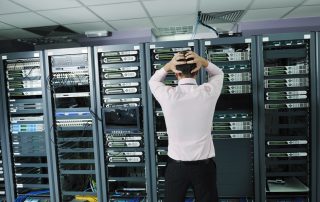Introduction to Home Office Cybersecurity
As more and more people are working from home, the need for proper cybersecurity measures is becoming increasingly important. Remote workers face unique challenges when it comes to protecting their devices and sensitive information from cyber threats. In this blog post, we will explore some of the most common security risks that remote workers face and how you can secure your home network against them.
Common Threats and Vulnerabilities for Remote Workers
One of the biggest risks faced by remote workers is hacking. Hackers use various techniques such as phishing emails or malicious software to gain access to your device and steal sensitive data. Another risk is unauthorized access to your Wi-Fi network, which could allow attackers to intercept your traffic and steal your passwords. Additionally, ransomware attacks have become increasingly popular in recent years, where attackers encrypt your files and demand payment in exchange for the decryption key.
How to Secure Your Home Network
There are several steps you can take to improve your home office cybersecurity:
1. Use strong passwords – make sure all your accounts have unique and complex passwords that cannot be easily guessed.
2. Install antivirus software on all your devices – this will help detect and remove any potential malware.
3. Keep your operating system up to date – regular updates often include security patches that fix vulnerabilities.
4. Enable two-factor authentication whenever possible – this adds an extra layer of protection to your accounts.
5. Set up a hardware firewall – this will provide additional protection against incoming threats.
The Importance of Using Strong Passwords
Strong passwords are essential for keeping your online accounts safe. Avoid using simple words or phrases, and instead use a combination of uppercase and lowercase letters, numbers, and symbols. It’s also recommended to use password managers to generate and store complex passwords.
Do You Need a Hardware Firewall at Home?
A hardware firewall is a physical device that sits between your router and modem, providing an additional layer of protection against incoming threats. While many routers come with built-in firewalls, they may not offer enough protection against advanced threats. If you work remotely and handle sensitive information, investing in a hardware firewall is highly recommended.

Conclusion: Taking Action Towards Better Security
Protecting your home office from cyber threats requires vigilance and proactive measures. By following best practices like using strong passwords, updating your software regularly, and setting up a hardware firewall, you can significantly reduce your risk of falling victim to cyberattacks. Remember, prevention is always better than cure, so taking action now can save you time, money, and stress in the long run.
Maximize Your Productivity at Home with the Latest Remote Working Software
Remote working has become increasingly popular in recent years, and it's no wonder why. With advancements in technology, people are now able to work from anywhere they want, whether that
The Ultimate Guide to Setting up a Productive Home Office
Introduction to Setting up a Productive Home Office Setting up a home office can be an exciting and daunting task. Whether you're starting your own business or working remotely, creating
Why Remote Work is Not For Everyone (And How to Tell if It’s Right for You
Remote work has become increasingly popular in recent years, with more and more companies offering remote positions or allowing employees to work from home. While working remotely can offer many
5 Ways You Can Make $150 a Day From Home Without Breaking the Bank
Working from home is becoming increasingly popular as more and more people seek to create their own schedules, work on projects they love, and earn extra income. In this blog
Exploring the Advantages of Work from Home Jobs
Discover the advantages of work from home jobs, including flexibility and reduced commute times. Learn how to identify legitimate remote job opportunities and set up a home office for optimal productivity. Explore part-time remote roles and find tips for excelling in data entry work. Plus, discover strategies for effective time management and maintaining a healthy work-life balance when working from home.
The Importance of Hardware Firewalls in Home Offices: Why You Need One and How to Set It Up
Do you ever feel like your home office is vulnerable to cyber attacks? If so, then it's time to invest in a hardware firewall. A hardware firewall is an essential







